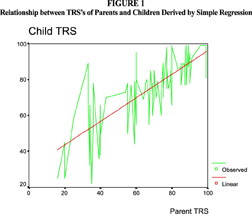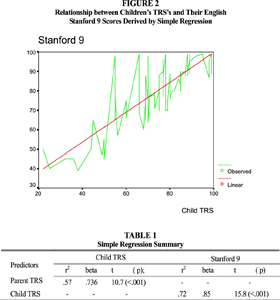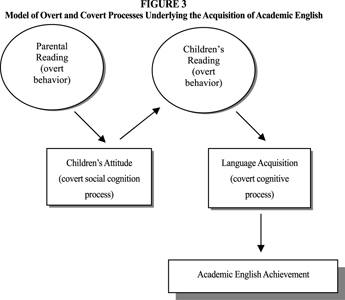5. Results
Figure 1 below shows that parental FVR in Korean is a strong indicator of their children’s FVR in English, as measured by their respective title recognition scores (hereafter TRS). In Table 1 the results of further statistical analysis are presented: parental FVR in Korean as the independent variable explains 57% of the variation in the children’s FVR in English, and this result is confirmed by the F-test (p<.001).
FIGURE 1
Relationship between TRS’s of Parents and Children Derived by Simple Regression
Figure 2 below shows that children’s FVR in English as measured by their TRS’s is a strong predictor of their English Stanford 9 scores. In Table 1 the results of further statistical analysis are presented: children’s TRS’s as the independent variable explains no less than 72% of the variation in the children’s English Stanford 9 scores, and this result is confirmed by the F-test (p<.001).
FIGURE 2
Relationship between Children’s TRS’s and Their English
Stanford 9 Scores Derived by Simple Regression

TABLE 1
Simple Regression Summary
Child TRS Stanford 9
r2 beta t ( p); r2 beta t ( p)
.57 .736 10.7 (<.001) - - -
Child TRS - - - .72 .85 15.8 (<.001)
VII. GENERAL DISCUSSION AND SUGGESTIONS FOR FURTHER RESEARCH
The culture of literacy (especially as manifested by reading behavior) that is provided by the parents, despite their linguistic differences vis-à-vis their children, influences their children’s attitudes towards reading, which in turn largely determine the children’s FVR habits. Undoubtedly children’s attitudes toward reading are also influenced by their school experiences, not least by their teachers’ modeling of reading behavior (Morrow, 1982). From a wider perspective, the habit of reading can be seen as one of many cognitive activities that, as Vygotsky (1978) pointed out, are initially experienced in interactive settings and later adopted by children to form part of their own repertoire of skills.
FIGURE 3
Model of Overt and Covert Processes Underlying the Acquisition of Academic English

The finding that the amount of FVR done by Korean-American 6th and 7th grade students, as measured by their title recognition scores, explains 72% of the variation in their English Stanford 9 scores, is very striking. Once again FVR has proved to be an important resource for fostering academic English achievement. By way of summarizing the main themes of this article, Figure 3 presents a schematic model of the contributions of parental reading behavior and their children’s FVR to the children’s acquisition of academic English.
Globalization has given members of the human race closer contact with each other, with the result that non-English speakers now have greater opportunities to interact with English speakers. However, as long as opportunities for English interaction continue to be limited in many countries, including Korea, reading is likely to serve as the principal source of English input. This, in turn, suggests that it would be valuable to further investigate the impact that FVR in English has on learning English as a foreign language in Korea. A finding that free voluntary reading in English has a strongly positive effect on learning English in Korea could revolutionize the teaching of English in Korea.